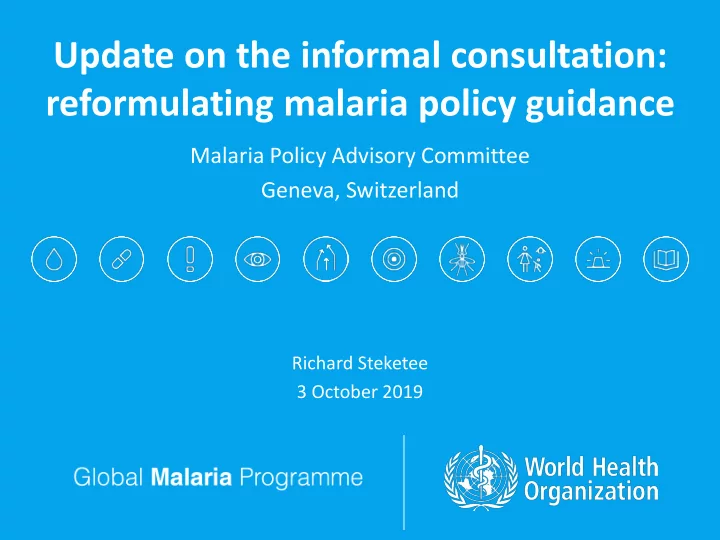

Update on the informal consultation: reformulating malaria policy guidance Malaria Policy Advisory Committee Geneva, Switzerland Richard Steketee 3 October 2019
Objectives of the informal consultation Convened in Geneva, Switzerland on 17-18 September 2019 to reconsider the formulation of malaria policy guidance. Participants included: • end users of GMP guidance from NMCPs, • GFATM, Gates Foundation and PMI • academics and researchers • WHO advisers Objectives • To explore how policy recommendations from WHO guideline development processes can be reformulated to: increase generalizability/transferability , and support problem-solving approaches in malaria control . • Consider specific examples to explore the need for and feasibility of reformulating malaria policy recommendations . • Articulate principles to guide the formulation of malaria guidance.
Background to the meeting • WHO uses evidence-informed processes to develop guidance • Most robust evidence comes from randomized controlled trials (RCTs) • Information from other study designs is considered • RCTs done in tightly controlled conditions • Tendency for guidance to focus on situations in which evidence is available • E.g. Seasonal Malaria Chemoprevention (SMC) – o 60% of malaria cases in 4 consecutive months; Children aged 3-59 months • Impossible to study all relevant questions in all relevant settings • Are there situations in which WHO should support countries to move beyond the immediate evidence? • If so, when? And how?
Request to the end users of GMP guidance The Global Malaria Programme is seeking feedback from those responsible for interpreting and acting upon WHO malaria guidance Consider the individual WHO malaria recommendations • Which do you find difficult to act on? • How could individual recommendations be changed to make them more useful? • What guidance is missing or incomplete?
Transferability : the degree to which evidence from interventions in one context may be used to inform decisions in another context (with/without modifications to the analysis or interpretation)
The transferability spectrum Not transferable Transferable without Transferable with adjustments* adjustments* (generalizable) *“Adjustments” may be quantitative or qualitative, ranging from simple to complex (as described by Barbieri et al. 2010)
Themes & key points from the discussions • Problem-solving approach • Leveraging existing flexibilities • Intervention mixes • “Living” guidelines and processes • Reformulating recommendations • Dissemination/deployment of guidance
Problem-solving in malaria control & elimination • As malaria control improves, underlying heterogeneity in malaria risk is revealed • To continue to improve and to maximise the impact of limited resources, a flexible problem-solving approach must emerge to address the heterogeneity • Deploy the most appropriate packages of interventions for the range of settings within a country • Need guidance which fosters flexibility in the implementation of existing tools and strategies
Leveraging existing flexibilities • Policy developers can leverage a range of evidence types during guideline development • Countries can leverage existing operational (« How-to-do ») documents that complement guidelines and recommendations • Countries can leverage flexibilities in funder policies and practice
Tanzania: Heterogeneity and intervention mixes Mean pfpr 1990-2017 (NMCP, KEMRI Welcome Trust, 2018) 10
RHR, HIV and MNCAH departments shared perspectives … “living” prioritization processes … “living” technical working group Akl E et al. Living systematic reviews: 4. Living guideline recommendations. Journal of Clinical Epidemiology 91 (2017) 47e53 11 Filename
Supporting countries : HBHI example • New response launched by WHO and RBM Partnership at high-level event in Maputo (Nov 2018) • Initial focus on the 10 + 1 highest burden countries • Lessons learned will be applied to other countries with a high burden of malaria
HBHI – intervention mixes and prioritization Budgeting – GF grants etc., National Malaria Strategic Plan prioritization can be done as new (5 years, may reoriented half way) substantial funding become available Stratify for Epidemiologic NMSP Intervention intervention stratification costing prioritization targeting Mathematical models (optimization of intervention mixes and budgets)
Outcomes of the informal consultation • Common themes emerged including identifying recommendations for early review • Principles to apply when considering modifying / broadening existing recommendations or developing new recommendations which extend beyond available evidence • Consensus statement
Consensus Statement Document is available Rationale • Countries are already stratifying • Different intervention mixes are likely needed in different strata within countries to maximise impact of available resources Excerpt from statement • Intervention prioritization should not be driven solely by sequentially optimizing single interventions for maximal coverage; • Instead, intervention prioritization should be based on local evidence and aligned to the specific needs of different epidemiological strata/settings as defined in the country’s NSP
Recommend
More recommend